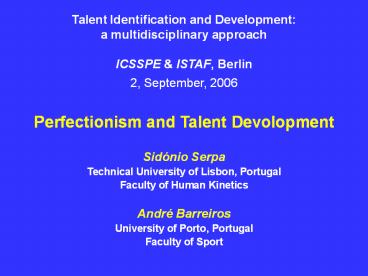Talent Identification and Development: a multidisciplinary approach ICSSPE - PowerPoint PPT Presentation
1 / 35
Title: Talent Identification and Development: a multidisciplinary approach ICSSPE
1
Talent Identification and Development a
multidisciplinary approachICSSPE ISTAF,
Berlin2, September, 2006
Perfectionism and Talent Devolopment Sidónio
Serpa Technical University of Lisbon,
Portugal Faculty of Human Kinetics André
Barreiros University of Porto, Portugal Faculty
of Sport
2
SPORT TALENTS AND PSYCHOLOGY
- Literature reports psychological characteristics
associated to high achievement in sport - Motivation
- Resilience
- Achievement goals
- Coping strategies
- Social support
- Perfectionism
- ...
3
PERFECTIONISM AND PERFORMANCE
- Either
- Facilitating OR Disturbing
4
TYPES OF PERFECTIONIST ORIENTATION - Adjusted
orientation (positive) - Unadjusted orientation
(negative/neurotic) Hamachek, 1978
5
ADJUSTED PERFECTIONISM - High personal
standards - High achievement need - High
intrinsic motivation Hamachek, 1978
6
UNADJUSTED PERFECTIONISM - Motivation to avoid
failure - Perception of environment as a threat
(not as a source of social support) -
Excessive critical evaluation concern over
mistakes doubts about actions exagerated
parents expectations Frost Col., 1990
7
PERFECTIONISM and TALENT IN SPORTResearch on
American Olympic Champions Gould, Dieffenbach
Moffet, 2002
8
PERFECTIONISM and TALENT IN SPORTResearch on
American Olympic Champions Gould, Dieffenbach
Moffet, 2002
- High values of
- Personal standards
- Organization
- Low levels of
- Parental criticism and expectations
- Doubts about actions
- Concern over mistakes
9
Perfectionism and Talent Devolopment
- AIM OF THE RESEARCH
- - To study perfectionism as a component of
talent in Portuguese young soccer players
10
PARTICIPANTS
- 211 young Portuguese soccer players
- 82 talented players (members of regional/national
teams) - 129 non-talented players
- Male players
- Two phases of the sports career
- lt17
- lt19
11
TOOL
- Multidimensional Perfeccionism Scale
- (Portuguese version Serpa, Alves Barreiros,
2004), from Frost, Marten, Lehart Rosenblat,
1990) - 35 items
- 5 points Likert scale
- Dimensions
- Personal standards
- Organization
- Concern over mistakes
- Parental expectations
- Parental criticism
- Doubts about actions
12
RESULTS
13
PERFECTIONISMTalent X Non-Talent(general sample)
14
PERFECTIONISMTalent X Non-Talent(general sample)
ADJUSTED PERPECTIONISM
15
PERFECTIONISMTalent X Non-Talent(general sample)
ADJUSTED PERPECTIONISM
UNADJUSTED PERPECTIONISM
16
PARENTAL SUPPORTTalent X Non-Talent(general
sample)
- Comparing talented and non-talented players in
each age group...
17
PERFECTIONISMTalent X Non-Talent (group lt17)
P0,06
18
PERFECTIONISMTalent X Non-Talent (group lt17)
P0,06
- PERSONAL STANDARDS EMERGE AS A MAJOR CRITICAL
ASPECT
19
PERFECTIONISMTalent X Non-Talent (group lt19)
20
PERFECTIONISMTalent X Non-Talent (group lt19)
ADJUSTED PERPECTIONISM
21
PERFECTIONISMTalent X Non-Talent (group lt19)
ADJUSTED PERPECTIONISM
- DO TALENTS LEARN HOW TO DEVELOP THE
- ADJUSTED PERFECTIONISM ?!
- OR...
- THE ADAPTED PERFECTIONISTS ARE
- NATURALLY SELECTED
22
Perfectionismtalented(groups lt17 lt19)
- QUESTION
- Do older and younger talents differ regarding
the perfectionism patterns?
23
PERFECTIONISM lt17 X lt19(talented)
ADJUSTED PERPECTIONISM
lt17 lt19 (NS)
lt17 lt19 (NS)
UNADJUSTED PERPECTIONISM
24
Perfectionismtalented(groups lt17 lt19)
- Younger and older talents seem to have equivalent
perfectionism patters
25
AND WHAT ABOUTCOMPARISONS lt17 X gt19IN
NON-TALENTED PLAYERS?
26
PERFECTIONISM lt17 X lt19(non-talented)
27
PERFECTIONISM lt17 X lt19(non-talented)
Reduced parents investment in their childrens
sports career ?!
28
Question- COULD THE EVENTUAL REDUCING PARENTS
INVESTMENT IN THEIR CHILDRENS SPORTS CAREER,
BE RELATED TO A DECREASING SPORTS ACHIEVEMENT ?
29
Socialization Model of Children
Behaviour Social-Cognitive Theory (Taylor,
Baranowski Sallis, 1984)
30
Socialization Model of Children
Behaviour Social-Cognitive Theory (Taylor,
Baranowski Sallis, 1984)
ENVIRONMENT
PARENTS BEHAVIOUR
CHILDRENS BEHAVIOUR
PARENTS COGNITIONS
CHILDRENS COGNITIONS
31
PARENTAL SUPPORT IN TALENTED SOCCER
PLAYERS(Serpa Barreiros, 2006)
32
PARENTAL SUPPORT IN TALENTED SOCCER
PLAYERS(Serpa Barreiros, 2006)
- THE PARENTS OF TALENTED SOCCER PLAYERS HAVE A
SPECIFIC BEHAVIOURAL PATTERN, BASED ON HIGH
EMOTIONAL SUPORT AND LOW REJECTION - FATHERS
AND MOTHERS HAVE SMALL DIFFERENT PATTERNS
33
PERFECTIONISM IN TALENTED SOCCER
PLAYERSCONCLUSIONS
- Talented and non-talented soccer players have
different perfectionism patterns - Talented players have higher adjusted
perfectionism and lower unadjusted perfectionism - Talented players seem to be stable regarding the
perfectionism patterns along the career, unlike
the non-talented players - Lower levels of parent expectations and criticism
in the older non-talented players may be
interpreted as a decreasing investment of their
parents in the childrens sport career.
34
PERFECTIONISM IN TALENTED SOCCER PLAYERS
- GENERAL CONCLUSION
- PERFECTIONISM SEEMS TO BE A COMPONENT OF SPORTS
TALENTS - Training strategies should be developed for the
modeling of positive perfectionism in youngsters
35
THANK YOU VERY MUCH FOR YOUR KIND ATTENTION
! sserpa_at_fmh.utl.pt































